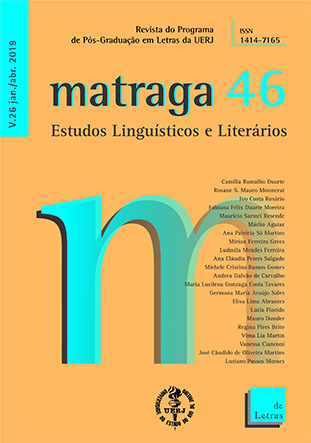O papel de 'O dia dos prodígios', de Lídia Jorge, na fundação da prosa portuguesa contemporânea
DOI:
https://doi.org/10.12957/matraga.2019.37284Palavras-chave:
prosa portuguesa contemporânea, Lídia Jorge, O dia dos prodígios, texto fundador.Resumo
Este artigo apresenta considerações a respeito de O dia dos prodígios (1980), romance de estreia da escritora portuguesa Lídia Jorge, e seu estabelecimento como um dos romances fundadores da prosa contemporânea daquela literatura. Por apresentar aspectos inovadores, os quais apontam para um processo de ruptura com a geração que o antecedeu, O dia dos prodígios foi considerado pelo filósofo Eduardo Lourenço como um romance-chave para compreender a Revolução dos Cravos (1974) e suas consequências, com o distanciamento de seis anos em relação ao levante. A partir dessa constatação, este artigo discutirá os principais aspectos transformadores do romance, no sentido de confirmar seu caráter fundador, o qual, diga-se, se dá em conjunto com outras obras publicadas em seu entorno temporal.
Downloads
Downloads
Publicado
Como Citar
Edição
Seção
Licença
AUTORIZAÇÃO
A Matraga – Revista do Programa de Pós-Graduação em Letras da UERJ está autorizada a publicar o artigo ora submetido, caso seja aceito para publicação online. Fica atestado que a contribuição é original, que não está sendo submetida a outro editor para publicação, e que a presente declaração é a expressão da verdade.
Os trabalhos publicados no espaço virtual da Matraga – Revista do Programa de Pós-Graduação em Letras da UERJ serão automaticamente cedidos, ficando os seus direitos autorais reservados à Matraga. Sua reprodução, total ou parcial, é condicionada à citação dos autores e dos dados da publicação.

A Matraga utiliza uma Licença Creative Commons - Atribuição-NãoComercial 4.0 Internacional.





